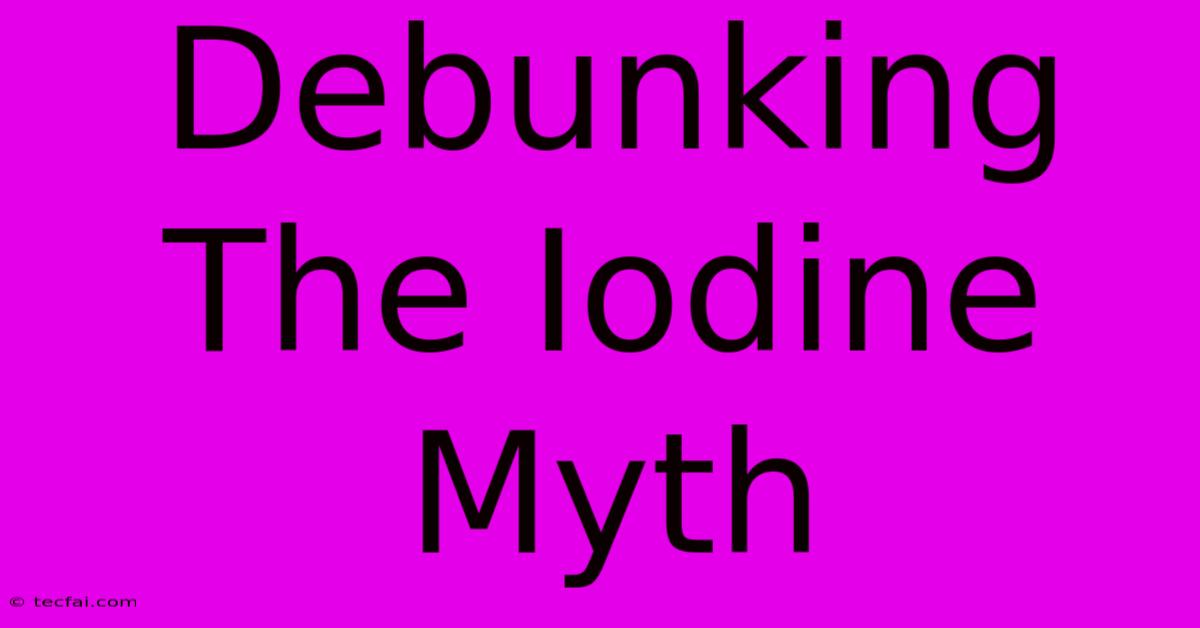Debunking The Iodine Myth

Discover more detailed and exciting information on our website. Click the link below to start your adventure: Visit Best Website tecfai.com. Don't miss out!
Table of Contents
Debunking the Iodine Myth: Separating Fact from Fiction
Iodine. The name conjures images of healthy thyroids and optimal metabolism. But in the world of online health advice, iodine has become shrouded in myth and misinformation. This article aims to debunk the common misconceptions surrounding iodine supplementation and clarify its true role in maintaining health.
The Truth About Iodine's Role in the Body
Iodine is an essential micronutrient, meaning our bodies require it in small amounts to function properly. Its primary function is in the production of thyroid hormones, thyroxine (T4) and triiodothyronine (T3). These hormones regulate a vast array of bodily functions, including:
- Metabolism: Controlling how quickly your body burns calories.
- Growth and Development: Crucial during fetal development and childhood.
- Brain Function: Impacting cognitive abilities and mental clarity.
- Heart Rate and Blood Pressure: Maintaining a healthy cardiovascular system.
A deficiency in iodine can lead to hypothyroidism, a condition characterized by a sluggish metabolism, weight gain, fatigue, and cognitive impairment. Severe iodine deficiency during pregnancy can cause cretinism in the developing fetus, leading to irreversible intellectual and physical disabilities.
However, the critical point is balance. Too little iodine is harmful, but so is too much.
Debunking Common Iodine Myths
The internet is rife with claims regarding iodine's benefits, many of which lack scientific backing. Let's address some prevalent myths:
Myth 1: Iodine Cures or Prevents Cancer
False. While some studies suggest a correlation between iodine deficiency and an increased risk of certain cancers, there's no conclusive evidence that iodine supplementation prevents or cures cancer. In fact, excessive iodine intake can potentially stimulate thyroid cell growth in susceptible individuals, increasing the risk of thyroid disorders.
Myth 2: High-Dose Iodine Detoxifies the Body
False. The idea of iodine detoxifying the body is unsubstantiated. The body has its own natural detoxification mechanisms, and overwhelming it with high doses of iodine can be dangerous and lead to iodine toxicity.
Myth 3: Everyone Needs Iodine Supplementation
False. Most people in developed countries obtain sufficient iodine through their diet (iodized salt, seafood, dairy). Supplementation should only be considered after consulting a doctor, particularly if you have a diagnosed iodine deficiency or a thyroid condition. Self-medicating with iodine can have severe consequences.
Myth 4: More Iodine is Always Better
False. This is perhaps the most dangerous myth. Excess iodine can lead to hyperthyroidism (overactive thyroid), characterized by symptoms such as rapid heartbeat, weight loss, nervousness, and insomnia. Severe iodine toxicity can be life-threatening.
The Importance of Consulting a Healthcare Professional
Before considering iodine supplementation, it's crucial to consult your doctor or a registered dietitian. They can assess your individual needs, determine if you have an iodine deficiency, and advise on the appropriate dosage (if any). Self-treating with iodine can be risky and potentially harmful.
Conclusion: A Balanced Approach to Iodine
Iodine is undoubtedly essential for optimal health, but its benefits are achieved through a balanced approach. Avoid falling prey to misinformation. Focus on maintaining a healthy diet rich in iodine-containing foods and consult a healthcare professional before considering any supplementation. Remember, moderation and professional guidance are key to reaping the benefits of iodine without jeopardizing your health.

Thank you for visiting our website wich cover about Debunking The Iodine Myth. We hope the information provided has been useful to you. Feel free to contact us if you have any questions or need further assistance. See you next time and dont miss to bookmark.
Featured Posts
-
Gst Pause 250 Checks Incoming
Nov 22, 2024
-
Sydney Cbd Report Of A Shooting
Nov 22, 2024
-
Radioactive Waste Triggers London Evacuations
Nov 22, 2024
-
Chicken Recall Alert Dunnes Stores Issue
Nov 22, 2024
-
Indias Bowling Mastery Australias Collapse
Nov 22, 2024
